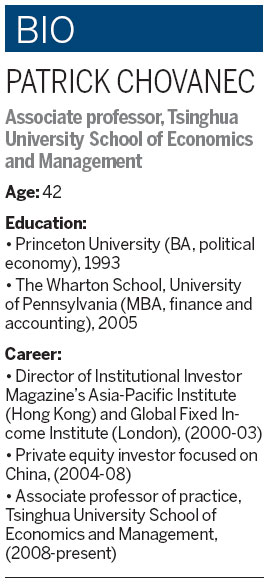Trade friction is teething problem
Updated: 2013-01-25 07:58
By Todd Balazovic (China Daily)
|
||||||||
|
Patrick Chovanec is confident that any hurdle China's economy faces today can be overcome. Feng Yongbin / China Daily |
Misunderstandings to blame for China-US trade spats, Tsinghua academic says
With more Chinese companies looking to spread their wings in overseas markets, Patrick Chovanec believes that trade friction is often a misconception.
The 42-year-old associate professor at the Tsinghua University School of Economics and Management says the real problem facing Chinese businesses that are planning investments in the US markets is the learning curve of understanding how different systems work.
"Living (in China), I know there is a perception that the US is hostile to Chinese investment and Chinese business. But I don't think it's correct, I think it's founded on some misunderstandings," he says.
In the past four years, Chinese overseas investment in the United States has soared from less than $1 billion (750 million euros) in 2008 to a record $6.5 billion in 2012.
Accompanying the flow of cash has been several disputes between Chinese companies and US regulators, including a lengthy saga for Ralls Corp, a US subsidiary of China's largest construction machinery maker Sany Group. The company is suing US President Barack Obama, claiming that his decision to block its investment into four wind farms in Oregon was unconstitutional.
But, with a few exceptions, Chovanec believes the perceived hostility toward Chinese companies from the US is a result of teething pains experienced by China's businesses making the initial plunge of doing business overseas.

"This taps into a larger challenge that faces Chinese companies, not just in the US but in Europe, Latin America or elsewhere," he says.
"Chinese companies tend to hang their hats on the regulatory difficulties. They say there are things like Committee on Foreign Investment in the United States (CFIUS), they say there's hostility in Congress, that's why it's so difficult to invest in the US.
"For Chinese companies, I think it's easy to say 'oh they don't like us'. But the reality is that it is more complex. In some cases, it's not that anyone's to blame - it's just so new."
Sitting in the lobby of the historic St. Regis hotel in Beijing's Central Business District, Chovanec says that he would feel more at home at the American-style diner Peter's Tex-Mex adjacent to the hotel.
Settling into a drab brown booth overshadowed by a mural depicting a scene that would be at home in a John Wayne film, he delves into the importance of Chinese companies courting US policymakers and shareholders to make them feel comfortable before doing business.
"A lot of Chinese companies that do invest in the US don't necessarily take the time to proactively introduce themselves to policymakers or stakeholders," he explains, raising his voice to combat an over-festive rendition of Santa Claus is Coming to Town playing in the background.
"Both sides have to feel comfortable. Laying the foundation and explaining their intentions beforehand, making the rounds as the company develops its strategy, goes a long way.
"In some cases, it may help if those policymakers become cheerleaders and help you along the way."
It's clear from his easy-going Midwestern diction and relaxed demeanor that the Illinois native feels comfortable talking about the often sticky relationship between the US and China.
And he should.
Throughout most of his career, Chovanec has straddled the world of Washington politics and Chinese economics. First while working as an assistant to current Speaker of the House John Boehner during the mid-1990s, then as a private equity investor in Hong Kong in 2005.
But what spurred his interest in China was his father's surprise decision to take the family on a trip to the Asian nation in 1986, long before Beijing was considered a common tourist destination.
"My father came home one day with a brochure and said 'they're giving tours of China, we can go see the Great Wall'," he says.
He describes China of that time as very different to the modern nation seen today.
"Even places like Shanghai only had two or three hotels where foreigners could stay, and they were nothing fancy," he says.
"A lot of the airports we flew into were not even airports, they were air force bases. In places like Xi'an and Guilin you would just dive-bomb onto a landing strip where on each side the MiGs (fighter jets) were lined up.
"It was a totally different world."
Shortly after his first trip to China, Chovanec enrolled at Princeton University where he eventually earned his degree in political economy, before earning an MBA in finance and accounting from The Wharton School at University of Pennsylvania.
During his university days, Chovanec managed to revisit China, this time by himself, hauling a backpack full of his belongings throughout the less-traveled regions of China.
"I entered through Tibet, went down the Yangtze River, and made my way back up to Beijing before traveling along the Silk Road," he says.
Now fluent in Chinese, he attributes his six-month sojourn throughout China as the best language lesson he could have received.
"That's when I learned Chinese, because I had to get around. There was nobody there to help you at that time."
Chovanec says that while he has concerns about the country's short-term progress, he is confident that whatever hurdles the economy faces can be overcome.
"I'm not pessimistic about China in the long run. I don't think it's the end of the China story. I think there are lots of areas that hold the potential for real growth in the Chinese economy - agriculture, logistics, healthcare, retail, consumer branded products - there's huge potential for productivity gain.
"But the model that has taken up to this point won't necessarily take it to the next 10 or 20 years."
He says the problems China's economy faces now are not a result of any sort of failure on China's part, rather are a result of the successes China has seen in the past.
"A lot of the hanging fruit in terms of productivity gains that it was able to realize in the 1990s going forward are going to be a lot harder to realize. They are going to depend a lot more on official allocation of capital, they're going to rely a lot more on development of human resources.
"China's growth, prosperity and its impact on the global economy have changed the game going forward for China."
toddbalazovic@chinadaily.com.cn
(China Daily 01/25/2013 page24)

 Li Na on Time cover, makes influential 100 list
Li Na on Time cover, makes influential 100 list
 FBI releases photos of 2 Boston bombings suspects
FBI releases photos of 2 Boston bombings suspects
 World's wackiest hairstyles
World's wackiest hairstyles
 Sandstorms strike Northwest China
Sandstorms strike Northwest China
 Never-seen photos of Madonna on display
Never-seen photos of Madonna on display
 H7N9 outbreak linked to waterfowl migration
H7N9 outbreak linked to waterfowl migration
 Dozens feared dead in Texas plant blast
Dozens feared dead in Texas plant blast
 Venezuelan court rules out manual votes counting
Venezuelan court rules out manual votes counting
Most Viewed
Editor's Picks

|

|

|

|

|

|
Today's Top News
Boston bombing suspect reported cornered on boat
7.0-magnitude quake hits Sichuan
Cross-talk artist helps to spread the word
'Green' awareness levels drop in Beijing
Palace Museum spruces up
First couple on Time's list of most influential
H7N9 flu transmission studied
Trading channels 'need to broaden'
US Weekly

|

|








